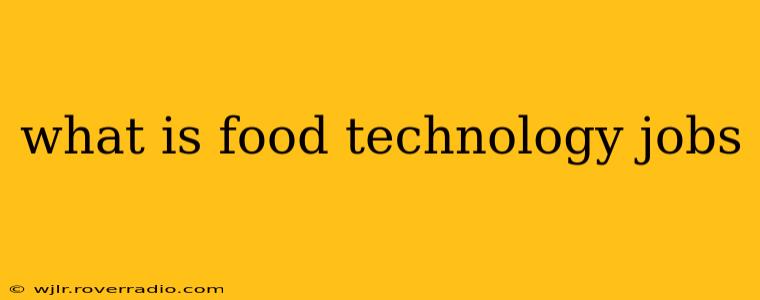What is Food Technology Jobs? A Deep Dive into Careers in Food Science
Food technology jobs encompass a broad range of exciting and impactful careers centered around the science and engineering of food. These roles involve improving food production, processing, preservation, packaging, and safety, ultimately ensuring a safe, nutritious, and appealing food supply for everyone. From the farm to the table (and everything in between!), food technologists play a vital role in the industry. Let's explore some key aspects of these diverse job opportunities.
What are the Different Types of Food Technology Jobs?
The field is incredibly diverse, offering roles that cater to various interests and skill sets. Some key areas include:
-
Research and Development (R&D): This involves developing new food products, improving existing ones, and exploring innovative food processing techniques. Food technologists in R&D conduct experiments, analyze data, and contribute to the creation of novel food items with enhanced nutritional value, shelf life, or taste.
-
Quality Control and Assurance (QA/QC): Professionals in QA/QC ensure food products meet safety and quality standards throughout the production process. They conduct tests, implement quality control measures, and ensure compliance with regulations. This is critical in maintaining consumer trust and preventing foodborne illnesses.
-
Production and Manufacturing: These roles focus on the efficient and safe production of food products. Food technologists in this area manage production lines, optimize processes, and ensure that products are made to the required specifications.
-
Packaging and Preservation: This involves developing innovative packaging solutions to extend shelf life, maintain product quality, and enhance consumer appeal. They consider factors like material selection, barrier properties, and sustainability.
-
Sensory Evaluation: Professionals in this area evaluate the sensory properties of food (taste, texture, aroma, appearance) to assess consumer preferences and guide product development.
-
Food Safety and Regulatory Affairs: These roles ensure compliance with food safety regulations and standards. They manage food safety programs, conduct audits, and stay updated on evolving regulations.
-
Food Engineering: This area focuses on the design and operation of food processing equipment and facilities. Food engineers optimize processes, improve efficiency, and develop new technologies for food production.
-
Nutrition and Health: Food technologists can also focus on the nutritional aspects of food, developing fortified foods or functional foods that address specific health needs.
What are the Skills Required for Food Technology Jobs?
Beyond a strong academic foundation in food science or a related field, various skills are essential for success in these roles:
- Scientific Knowledge: A comprehensive understanding of food chemistry, microbiology, and engineering principles.
- Problem-Solving Skills: The ability to troubleshoot issues in production, develop solutions to improve processes, and adapt to changing circumstances.
- Analytical Skills: The capacity to analyze data, interpret results, and draw meaningful conclusions from experiments and observations.
- Communication Skills: The ability to effectively communicate technical information to colleagues, clients, and regulatory bodies.
- Teamwork Skills: Food technology often involves collaborative efforts across different departments and disciplines.
- Project Management Skills: The ability to manage multiple projects simultaneously, meet deadlines, and stay within budget.
- Regulatory Knowledge: Familiarity with food safety regulations and standards is critical in many roles.
What Education and Training is Needed for Food Technology Jobs?
A bachelor's degree in food science, food technology, or a related field is typically required for entry-level positions. Advanced degrees (Master's or PhD) are often preferred for research, development, and academic roles. Many professionals also pursue certifications to further specialize their skills and knowledge.
What is the Job Outlook for Food Technology?
The job outlook for food technology professionals is generally positive, driven by growing global demand for food, increasing consumer awareness of food safety and nutrition, and ongoing advancements in food processing technologies. The field is expected to continue to grow and evolve, creating opportunities for innovative and skilled professionals.
How Much Do Food Technology Jobs Pay?
Salaries for food technology professionals vary widely depending on experience, education, location, and specific role. Entry-level positions typically offer competitive salaries, with significant earning potential as one gains experience and expertise.
What are the Career Paths in Food Technology?
Career progression can involve moving into leadership roles, specializing in a particular area, or pursuing advanced research opportunities. The field offers diverse career paths for those who are passionate about food and science.
This detailed exploration of food technology jobs provides a comprehensive overview, answering many common questions and highlighting the exciting opportunities within this critical field.
